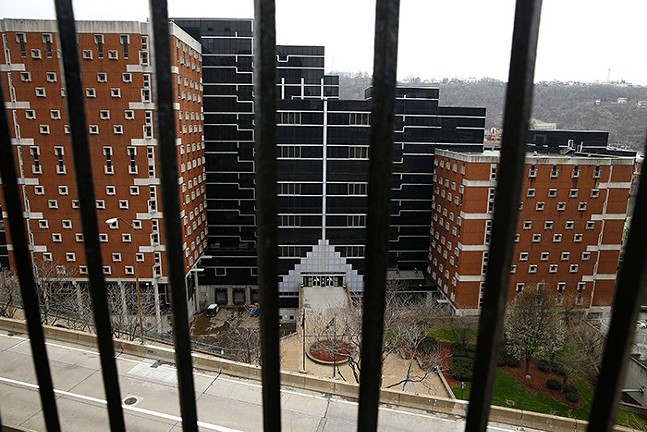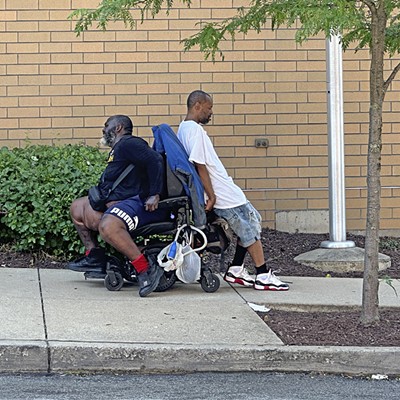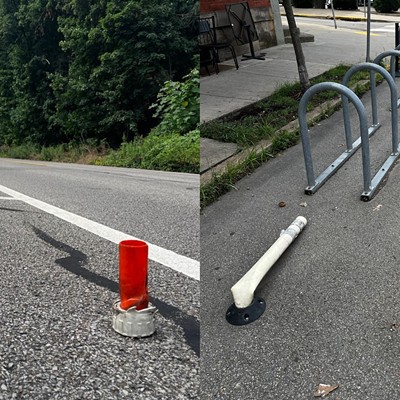"Kids also reported that [correctional officers] talk to them like they hate them and are uncomfortable and don’t feel safe when they are strip searched."
Surprise inspections led by two Jail Oversight Board members raise new concerns about sanitation, dire understaffing, mental health care, and conditions for teenagers at the county jail.
Board members Terri Klein and Corey O’Connor (also Allegheny County Controller) have published a report of two recent inspections of the county jail they made unannounced on Oct. 28 and Nov. 14. During these visits, Klein and O’Connor say they talked with jail staff and incarcerated individuals, and inspected several parts of the facility including intake, the kitchen, a men’s mental health pod, and the juvenile pod.
Intake crowding
O’Connor describes intake as a “crowded and busy area” where people wait to be processed and officially admitted to the jail. He says he was informed individuals are “often” held in intake in a communal cell for longer than “several days.”
“The Jail partly reasons that this [lengthy wait] is a mitigation effort from COVID-19,” he writes, “but all incarcerees are housed together and no steps are taken to test, check temperatures, use masks, socially distance, sanitize, or further ventilate.”
Klein’s report offers an alternate explanation for why people are allegedly spending so many days at intake — lack of mental health staff.
“There is currently no night shift for mental health staff, and no one can go upstairs until they are interviewed by mental health,” Klein writes. “This can back things up in Intake.”
Both O’Connor and Klein note they were told 149 people were in line to see a psychiatrist, with waiting periods stretching to 71 days.
Correctional staff complained to Klein and O’Connor that they are overworked and understaffed, according to their reports. Klein adds that some staff told her they were forced through mandatory overtime to work 16-hour shifts as often as four times a week.
Kitchen hygiene
In the kitchen, Klein writes that she observed issues related to cleanliness and sanitation.
She says she saw food trays come out of the dishwasher (known as “the beast,” she writes) dirty, with “food material still present in some of the trays.” She notes that a kitchen worker would often separate the dirty trays to be re-washed.
Klein also observed that clean trays are not dried before they are stacked for the next meal and put away, which means that “bread or cake can be placed into wet compartments and will be wet upon their arrival to the pod.”
Klein also shares that “kitchen workers reported frequently spotting roaches,” and complained about brown water and mice in cells. Those complaints accord with the jail kitchen’s health department inspection records, which have previously noted serious issues with pest management and plumbing.
According to both Klein and O’Connor, dinner is served by 4:30 p.m. and no additional food is provided until breakfast at 6:00 to 8:00 a.m.
“There is a very long time between dinner and breakfast which might explain why so many reported going to bed hungry,” Klein writes, referring to the University of Pittsburgh School of Social Work survey of jail conditions released this year. She recommends that the jail’s next, as-yet-unannounced food vendor serve dinner later in the day or provide snacks.
Mental health pod
On the men’s acute mental health pod, O’Connor and Klein say they learned the unit’s 24 beds are almost always full and those housed there are not allowed outside for recreation.
“If approved, they recreate in cages on the pod,” O’Connor writes. “2/4 of these recreation spaces have windows.”
“None have access to outside air,” Klein includes.
These observations echo concerns raised by fellow oversight board member Bethany Hallam, who has frequently questioned the jail administration and county lawyers about the jail’s mental health tier system, suggesting it may be discriminating against people with disabilities.
Klein and O’Connor say the jail’s mental health staff are beleaguered and under-resourced, having fallen from 125 to just 41.
“Staff reported there are residents with significant mental health issues that they cannot adequately care for,” Klein writes.
According to the report, medical staff complained to O’Connor that they are forced to follow orders from non-medical staff when it comes to medical issues.
Cold and hunger in juvenile pod
Recalling their visit to the juvenile pod, both Klein and O’Connor note the cold temperature.
“Juveniles admitted to being hungry and cold,” Klein writes. The oversight board members say both children and staff told them the children wouldn’t get coats until the end of November.
The teenagers also told Klein they are treated poorly by correctional staff.
Klein says the incarcerated children complained of “collective punishment where they are locked down when one person misbehaves” and that their school time was being counted as recreation time. Klein adds staff told her the kids get indoor recreation time separate from school.
"Kids also reported that [correctional officers] talk to them like they hate them and are uncomfortable and don’t feel safe when they are strip-searched," she writes.
Breaking point?
O’Connor says staff conveyed to him that the institution had reached a breaking point.
“Staff reported that providing basic needs such as adequate food, medical care, and resources have reached breaking points,” he writes, adding that staff told him the "jail’s administration has become more focused on the media around ACJ issues instead of improving basic administration and care for incarcerated residents."
Allegheny County Communications Manager Chris Togneri declined to address the details of the inspection reports, but writes in an emailed statement that Warden Orlando Harper will "take the information in these reports under advisement."
"Warden Harper thanks members of the Jail Oversight Board for visiting the jail to get a firsthand look at operations," Togneri writes. "The warden appreciates feedback, from members of the JOB and from incarcerated individuals themselves, and will take the information provided in these reports under advisement. The safety and security of the facility and all who work and are housed at the jail are the top priority of the ACJ admin. As always, when concerns are relayed in real-time, the ACJ leadership team can immediately address issues."
The findings of O’Connor and Klein’s inspections are likely to make the agenda for 2023’s first Jail Oversight Board meeting on Jan. 5 at 4:00 p.m.
Local jail news
ANTI-VAX SUIT
The Pennsylvania Record reports that a former Allegheny County Jail correctional officer says she was fired for refusing the COVID vaccine. She has filed suit in U.S. District Court with claims of religious discrimination.
CONTRABAND INVESTIGATION
On Dec. 19, TribLive reports, the county police arrested a correctional officer for bringing drugs into the jail for sale on the institution’s black market. The police subsequently announced charges against two additional people, one of whom was already incarcerated at the Allegheny County Jail. Raymond Toomey, the former jail employee, was previously a Pittsburgh Police officer, resigning in 2018 after a bystander released a video recording of him beating a suspect and kicking him in the face during an arrest, TribLive reports. At the time of that incident, KDKA reported Toomey had also previously been charged in a domestic violence incident.
MORE MONEY FOR POLICE
State senator Jay Costa recently announced $20 million of state public safety funding headed to Allegheny County. While the vast majority of the funding went to municipal, city, and county police, some were allocated to community-based and preventative programs, including over $500,000 to fund medication for opioid use disorder at the county jail, $75,000 to SisTers PGH for housing access, and $57,000 to two employment support programs.
Context: A recently-published statistical analysis of public spending in the 50 most populous U.S. cities found that 43 of them spend more on police and prisons than they do on health and human services combined. As experts on police and public safety note, research consistently demonstrates that non-carceral investments can produce significant public safety gains.
Who was in the jail this month?
Source: Allegheny County Analytics unless otherwise specifiedFrom Dec. 1, 2022 to Dec. 29, 2022
Average daily population of jail and alternative housing: 1,532 individuals.
Gender: Most people in the jail are men. Women make up about 12% of the jail population. It’s unclear how many trans, nonbinary, and/or gender nonconforming people there are in the jail.
Race: 67% of people incarcerated at the jail this month were Black. Allegheny County as a whole is 13% Black.
Children: Twenty five individuals under 18 are currently held in the jail, making up approximately 2% of its average daily population.
Senior citizens: 165 individuals over the age of 65 are currently held in the jail.
Isolation: The jail’s monthly segregation report says that the entire facility was on lockdown in November 2022 for COVID mitigation. The report says “all incarcerated individuals experienced limited time out-of-cell,” meaning fewer than the four hours of out-of-cell time mandated by the 2021 referendum banning solitary confinement at the jail.
COVID-19: According to the segregation report, as of Dec. 1, the facility had three COVID cases, and there were 18 in November.
In his monthly report to the oversight board, Warden Orlando Harper includes more detailed statistics about who was in the jail and what care they received. His most recent report covers Oct. 16 - Nov. 15 and includes information about service provision and staffing.
Security levels: On Nov. 1, the warden reported 551 individuals in the maximum security classification (41%), 510 individuals in the medium security classification (38%), and 293 individuals in the minimum security classification (22%).
Visits: From mid-October to mid-November of this year, 497 incarcerated individuals received a contact visit, making up 22% of the average daily population. No juveniles received contact visits during that time.



















